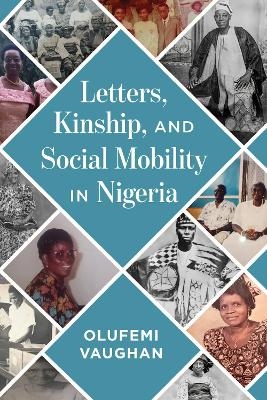
Letters, Kinship, and Social Mobility in Nigeria
Seiten
2024
University of Wisconsin Press (Verlag)
978-0-299-34454-2 (ISBN)
University of Wisconsin Press (Verlag)
978-0-299-34454-2 (ISBN)
- Noch nicht erschienen (ca. Dezember 2024)
- Versandkostenfrei
- Auch auf Rechnung
- Artikel merken
In 2003, Olufemi Vaughan received from his ninety-five-year-old father, Abiodun, a trove of more than three thousand letters written by four generations of his family in Ibadan, Nigeria, between 1926 and 1994. Reading deeply in these letters, Vaughan realized he had a unique set of sources to illuminate everyday life.
In 2003, Olufemi Vaughan received from his ninety-five-year-old father, Abiodun, a trove of more than three thousand letters written by four generations of his family in Ibadan, Nigeria, between 1926 and 1994. The people who wrote these letters had emerged from the religious, social, and educational institutions established by the Church Missionary Society, the preeminent Anglican mission in the Atlantic Nigerian region following the imposition of British colonial rule. Abiodun, recruited to be a civil servant in the colonial Department of Agriculture, became a leader of a prominent family in Ibadan, the dominant YorÙbÁ city in southern Nigeria. Reading deeply in these letters, Vaughan realized he had a unique set of sources to illuminate everyday life.
Letter writing was a dominant form of communication for Western-educated elites in colonial Africa, especially in Nigeria. Exposure to the modern world and a growing sense of nationalism were among the factors that led people to begin exchanging letters, particularly in their interactions with British colonial authorities. Vaughan reconstructs dominant storylines, including themes such as kinship, social mobility, Western education, modernity, and elite consolidation in colonial and postcolonial Nigeria. He brings to life a portrait, at once intimate and expansive, of a community during a transformative period in African history.
In 2003, Olufemi Vaughan received from his ninety-five-year-old father, Abiodun, a trove of more than three thousand letters written by four generations of his family in Ibadan, Nigeria, between 1926 and 1994. The people who wrote these letters had emerged from the religious, social, and educational institutions established by the Church Missionary Society, the preeminent Anglican mission in the Atlantic Nigerian region following the imposition of British colonial rule. Abiodun, recruited to be a civil servant in the colonial Department of Agriculture, became a leader of a prominent family in Ibadan, the dominant YorÙbÁ city in southern Nigeria. Reading deeply in these letters, Vaughan realized he had a unique set of sources to illuminate everyday life.
Letter writing was a dominant form of communication for Western-educated elites in colonial Africa, especially in Nigeria. Exposure to the modern world and a growing sense of nationalism were among the factors that led people to begin exchanging letters, particularly in their interactions with British colonial authorities. Vaughan reconstructs dominant storylines, including themes such as kinship, social mobility, Western education, modernity, and elite consolidation in colonial and postcolonial Nigeria. He brings to life a portrait, at once intimate and expansive, of a community during a transformative period in African history.
Olufemi Vaughan, the Alfred Sargent Lee ’41 and Mary Farley Ames Lee Professor and Chair of Black Studies at Amherst College, is the author of Religion and the Making of Nigeria, among other works.
List of Illustrations
Foreword by Adesoji Adelaja
Acknowledgments
Introduction
1 The Brothers’ Letters
2 The Matriarchs’ Letters
3 Ibadan CMS Men: Kinship and Yoruba Civic Public
4 The Gladys Aduke Vaughan Files
5 From Freetown with Love
Conclusion
Notes
Bibliography
Index
| Erscheint lt. Verlag | 17.12.2024 |
|---|---|
| Reihe/Serie | Africa and the Diaspora: History, Politics, Culture |
| Verlagsort | Wisconsin |
| Sprache | englisch |
| Maße | 152 x 229 mm |
| Gewicht | 454 g |
| Themenwelt | Geisteswissenschaften ► Geschichte ► Regional- / Ländergeschichte |
| Sozialwissenschaften ► Soziologie ► Makrosoziologie | |
| ISBN-10 | 0-299-34454-1 / 0299344541 |
| ISBN-13 | 978-0-299-34454-2 / 9780299344542 |
| Zustand | Neuware |
| Haben Sie eine Frage zum Produkt? |
Mehr entdecken
aus dem Bereich
aus dem Bereich
Erinnerungen
Buch | Softcover (2024)
Pantheon (Verlag)
CHF 22,40


